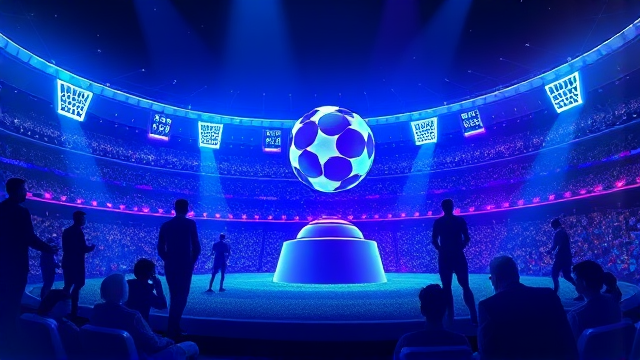UEFA Rejects Super League Proposals, Won't Change Champions League Format
In a move that feels like déjà vu for European football, UEFA has once again slammed the door shut on the specter of a Super League, publicly rejecting proposals from the organizing company A22 Sports Management that sought to fundamentally reshape the continent's premier club competition. The heart of the rejected proposal, as previously reported, was a radical two-tiered system for the Champions League's initial phase, where clubs would be segregated based on their coefficient ranking, a concept that smacks of the very elitism that made the original Super League pitch so toxic.This was paired with a tantalizing, almost populist sweetener: broadcasting marquee matches on a free-to-air platform, a direct challenge to the lucrative, but exclusionary, pay-TV model that currently dominates. UEFA, while confirming that its General Secretary, Theodoros Theodoridis, did indeed engage in several informal discussions with A22 co-founder Anas Laghrari in public settings, was unequivocal in its dismissal.The governing body's press service issued a statement that left no room for ambiguity, declaring, 'We can confirm reports that UEFA General Secretary Theodoros Theodoridis met several times with A22 Sports Management co-founder Anas Laghrari in public places. These discussions have not produced any official outcomes.We firmly state that there are no plans to change the format of the UEFA Champions League. ' This isn't just a simple 'no'; it's a strategic and political reaffirmation of UEFA's authority, a deliberate public flexing of institutional muscle designed to isolate A22 and reassure its member associations and commercial partners that the ship is steady.The context here is critical. The ghost of the April 2021 Super League launch, which saw twelve of Europe's wealthiest clubs—including my own beloved Barcelona, a decision I still grapple with as a fan—briefly declare independence, continues to haunt the corridors of power in Nyon.That brazen attempt to create a closed-shop competition, insulated from the traditional meritocracy of domestic leagues, provoked an unprecedented backlash from fans, governments, and players, forcing a spectacular collapse within 72 hours. However, the idea never truly died; it merely evolved.A22, now the public face of the project, has been engaged in a prolonged charm offensive, rebranding the concept around principles of 'open competition' and 'sustainability,' while simultaneously waging a legal war against UEFA's alleged monopoly status through the European Court of Justice. This latest proposal, with its free-to-air element, appears to be a cunning attempt to win over the public sentiment that so decisively turned against the project the first time around, painting UEFA as the greedy gatekeeper and positioning the Super League as the people's champion.But UEFA's swift and firm rejection reveals the deep-seated tensions that remain. For UEFA, the newly expanded Champions League format, set to debut in the 2024-25 season with its 'Swiss model' league phase, is its crown jewel and a multi-billion euro broadcasting asset.Tinkering with this engine of revenue, especially under pressure from a rebel entity, is unthinkable. It would be seen as a capitulation, a crack in the foundation of their governance.Furthermore, the two-tiered group idea, while novel, risks creating a permanent underclass of participants from smaller nations, undermining the romantic, albeit rare, possibility of a Sheriff Tiraspol stunning Real Madrid on a magical night—the very magic that fuels the competition's global appeal. Analytically, this stalemate is a fascinating game of high-stakes poker.A22 is betting that its legal challenges will eventually break UEFA's stranglehold, forcing a new, more pluralistic landscape for European football. Their strategy seems to be one of attrition, constantly putting new ideas on the table to keep the conversation alive and pressure mounting.UEFA, on the other hand, is playing the long game of institutional inertia, relying on its established partnerships, the financial allure of its existing competitions, and the deep-seated loyalty of most clubs to the pyramid structure. The consequences of this ongoing cold war are profound.It creates a climate of uncertainty that affects everything from club long-term financial planning to fan engagement. While the big clubs continue to agitate for a greater share of the pie, the smaller clubs fear being left further behind.This rejection by UEFA is not the end of the story; it's merely the latest chapter in a protracted battle for the soul and wallet of European football. The fundamental questions of governance, revenue distribution, and competitive integrity remain unanswered, and until they are, proposals like this from A22 will continue to emerge, and UEFA will continue to bat them away, leaving the beautiful game in a state of perpetual, high-stakes limbo where the only certainty is more conflict.
Latest News
For Chatham Town, a seventh-tier football club whose last significant FA Cup run concluded in the 1888/89 season when they reached the quarter-finals—a feat
19 minutes ago0 comments
In a breathtaking display of raw athleticism that evoked memories of Barry Sanders' most electrifying runs, Atlanta Falcons rookie sensation Bijan Robinson
49 minutes ago0 comments
The Arizona Cardinals' 31-27 loss to the Indianapolis Colts on Sunday felt less like another notch in their four-game losing streak and more like a seismic
1 hour ago0 comments
The NHL’s regular season is heating up, and if last night’s action is any indicator, we’re in for another wild ride.
1 hour ago0 comments
The NFL's Monday Night Football doubleheader concludes with a compelling NFC showdown between the Chicago Bears and Washington Commanders at Northwest Stadium,
1 hour ago0 comments
The Miami Dolphins' season continues to unravel in spectacular fashion, with quarterback Tua Tagovailoa's postgame comments following Sunday's 29-27 loss to
2 hours ago1 comments
In a stunning twist of fate that will be debated in Russian hockey circles for years, SKA Saint Petersburg snapped Avtomobilist Yekaterinburg's formidable
2 hours ago0 comments
In a dramatic Monday night showdown that will be debated in KHL taverns for years, SKA St.
2 hours ago1 comments
It’s quiet here...Start the conversation by leaving the first comment.
